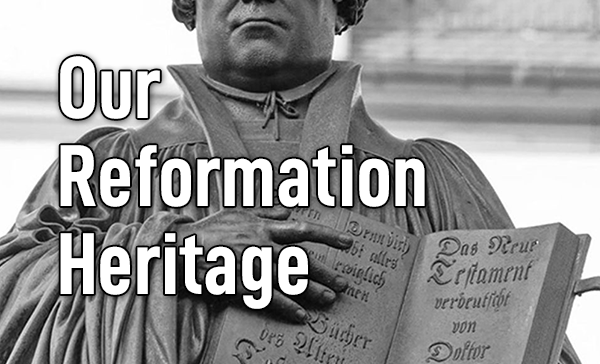
When David returned to the brook Besor after defeating the Amalekites, he insisted that the men who had remained behind to guard the baggage share fully in the spoils taken during the battle. This became a principle during David’s reign: the supporters of those on the front lines of battle were to share in the honors of victory. (see 1 Samuel 30)
We should apply the same principle as we consider our Reformation heritage. While we most often honor the leading reformers like Luther and Calvin, there were a host of others who contributed to the cause, without whom the men we know best would not have accomplished their work. Allow me to introduce you to two of those “lesser lights” – men who had a profound impact on the Reformation yet are largely unknown in the present day.
Johann von Staupitz was the German head of the Augustinian order of which Martin Luther became a member. Staupitz became Luther’s mentor and as his confessor had unique insight into Luther’s profound spiritual struggles. You see, although Luther was the quintessential monk, he still could not shake the conviction that he stood condemned as a sinner. He had done all that the Church required of him, but his soul knew no peace. As Luther dredged his conscience for more sins to confess, it was Staupitz who urged the future reformer to trust in a merciful God rather than in acts of penance. Unheeding, Luther undertook increasingly extreme forms of penance and became increasingly discouraged.
Undeterred, Staupitz had one more card to play. As the dean of theology at the new university in Wittenberg, he pressed Luther into service as a professor of Bible. There, as Luther studied for his lectures on the Psalms, Romans, Galatians, and Hebrews, the newly minted Doctor of Divinity slowly began to grasp the beauty of the gospel. It was while meditating on Romans 1.17 (“the just shall live by faith”) that Luther broke through to the biblical doctrine of justification by faith alone. And it was this doctrine in particular that led Luther to take a stand against theological error and thus ignite the massive revival we now know as the Reformation.
On the human level, none of this would have happened without Johann von Staupitz and his patient spiritual mentoring of Luther. Fascinatingly, although he supported Luther’s views and applauded the reformation he began, Staupitz never left the Roman Catholic Church.
Jacques Lefevre was a loyal Roman Catholic cleric who, by grace, came to understand the beauty of the gospel. He was convinced that justification was God’s work alone and a free gift and that the Bible was the supreme authority in matters of faith. As a Doctor of Divinity at the University of Paris, Lefevre strongly influenced many of his students in the direction of what would later be called “reformed” teaching.
Among his many students was a young William Farel. Farel was impressed by Lefevre and the two men – though widely separated in age – became friends. Lefevre led Farel into an understanding of the gospel and encouraged him saying, “My dear William, God will renew the world, and you will see it.”
Interestingly, as the young John Calvin began to question the Church’s teaching, he deliberately sought out Lefevre. No record of that conversation has been preserved, but soon afterward, Calvin openly embraced the Reformation. Not long afterward, Farel met Calvin in Geneva and convinced Calvin to join in the work of reformation in that city.
Jacques Lefevre remained loyal to the Roman Church. However, his proto-reformed views made continued residence in France dangerous, and so he sought protection from Marguerite of Navarre. He was in exile there when he met with Calvin and still there when he died peacefully in 1536 (the same year Calvin published the first edition of the Institutes).
Like David’s men at the brook, Staupitz and Lefevre were not at the forefront of the battle, but they contributed significantly to the victory won by those who were better known. I believe they will share in the blessings of that victory – as will the rest of us “lesser lights” as we faithfully serve Christ where He has placed us.
~ Dan Steere







